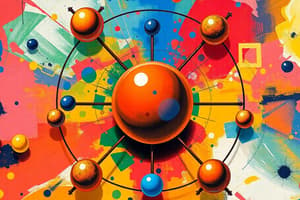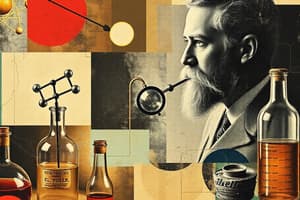Podcast
Questions and Answers
All matter is made of atoms. Atoms are indivisible and indestructible. They cannot be subdivided, created, or destroyed.
All matter is made of atoms. Atoms are indivisible and indestructible. They cannot be subdivided, created, or destroyed.
False (B)
All matter is made of atoms. Atoms are divisible and destructible with nuclear chemistry and cannot be created or destroyed.
All matter is made of atoms. Atoms are divisible and destructible with nuclear chemistry and cannot be created or destroyed.
True (A)
Atoms of a given element are identical in mass and properties.
Atoms of a given element are identical in mass and properties.
False (B)
Atoms of a given element are not identical in mass and properties because of the existence of isotopes.
Atoms of a given element are not identical in mass and properties because of the existence of isotopes.
Compounds are formed by the combination of two or more different kinds of atoms in simple, whole number ratios.
Compounds are formed by the combination of two or more different kinds of atoms in simple, whole number ratios.
A chemical reaction is a rearrangement of atoms. The atoms are combined, separated, or rearranged.
A chemical reaction is a rearrangement of atoms. The atoms are combined, separated, or rearranged.
Flashcards are hidden until you start studying
Study Notes
Dalton's Atomic Theory Overview
- All matter consists of atoms, which are the basic building blocks of matter.
- Atoms were once thought to be indivisible and indestructible, but this has been proven false with advances in nuclear chemistry.
Key Statements of Dalton's Theory
- Atoms of a specific element were believed to be identical in both mass and properties; this is now considered false due to the existence of isotopes, which vary in mass.
- Modern understanding recognizes that isotopes account for differences in the same element, disproving the idea of uniformity among atoms of the same element.
Compound Formation
- Compounds are created when different types of atoms combine in simple whole number ratios.
- This ratio-based combination of elements underpins the formation of various chemical compounds.
Chemical Reactions
- Chemical reactions involve the rearrangement of atoms, leading to combinations, separations, or reconfigurations of these atoms.
- This concept emphasizes that while atoms themselves are not created or destroyed in reactions, their arrangements and connections are modified.
Studying That Suits You
Use AI to generate personalized quizzes and flashcards to suit your learning preferences.




